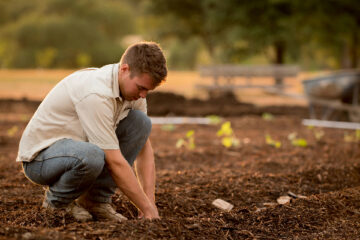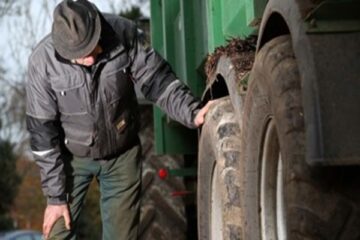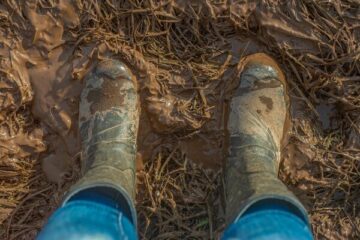In October 2009, Peter Gohery had a life-changing workplace accident that resulted in the loss of a leg, severe damage to the other and numerous other injuries. His road to recovery inspired him to devote his career to farm safety and advising workers in high-risk environments on the dangers and realities of the lack of health and safety in the workplace.
These days, he delivers behavioural based safety talks and lectures in different forms around the country, sharing his story and explaining his motto of “it’s better to lose a minute in life than lose your life in a minute.” Because of his accident, he’s always looking at ways of making life easier around my farm and safer.
He always wants to promote safety and he’s always looking at ways to drive the message home. He would love to see all farmers grow old and educate the next and future generations around farm safety. Ultimately, farmers listen to farmers and should be encouraged to tell their stories to make their farms a safer place.
The following Q&A focused on Peter’s work relating to workplace safety on farms.
Tell me about the industry you work in and what a health and safety advisor does on a day-to-day basis?
Following on from my accident about twelve years ago now, I went back to college to gain qualifications in health and safety so that I could use my knowledge and my ‘big mouth’ to help improve safety across workplaces in Ireland, especially on farms. I did a two year course in Athlone IT to become qualified as a health and safety officer.
Following this, I found it difficult to find a job in the industry in the beginning. I was lucky enough to get in with the Airton Group as the health and safety officer across a couple of their sites across the country.
What appealed to you about the role of a health and safety officer?
In 2012, I gave a talk to a group of farmers and I remember their reaction very clearly; they were like putty in my hand, hanging onto every word I said. No matter what I said they were listening. There was a lady sitting next to me who was from the Health and Safety Authority and she began asking me what qualifications I had to speak about farm safety and where I learned to speak so well in public. What I said to her was that I learned to speak in public in the ‘College of Life’, and about my qualifications, I showed her my prosthetic leg and said, “I think that gives me any qualification higher than a doctorate”. Unfortunately, I went through it all and I have all of the scars to show. However, I’m one of the lucky ones who gets to come out the other side of it.
As we come into the busy season for farming, we are likely to see an increase in farming accidents. Is this something that you’re concerned about?
I started working on the farm from a young age, helping out at home from around the age of 10. My father then started experiencing health issues which meant he could no longer do a lot of things that needed to be done. So I began to assume these responsibilities around the age of 12. By the age of 14, I was driving the tractors, doing most of the farm tasks on a daily basis and working with contractors on the farm. Back then, there were no strict rules surrounding children working on the farm and there was a lot more of it happening.
I had a huge interest in everything to do with farming. But after losing my leg in the accident, I didn’t want any other farmer to have to experience what I went through. It was certainly a hardship, and I really want to educate as many farmers as possible about farm safety. I would especially like to focus on young farmers and children on farms, as these are the most vulnerable to farming accidents. Today, the tractors and machines are unbelievably powerful and can cause disastrous accidents if proper safety isn’t used.
Do you feel that there is a much greater risk now than when you worked on the farm?
Definitely. For example, take the roads. They are a much more dangerous place now than they were 20 or 30 years ago. People are always in a rush, trying to overtake you in a tractor even on dangerous bends where they have no sight of oncoming traffic. This isn’t necessary. Farmers will always pull in and let cars pass when there’s a safe place to do so. People cannot be taking those chances, it puts their own life at risk as well as the farmer’s life.
Farmers should be trained on how to drive tractors on busy roads. You need to be aware of everything happening while you’re driving a tractor, it’s not as simple as getting in and off you go. Especially for young lads — who think they’re invincible at times — it is important to get the necessary training to ensure safety when they’re driving tractors on the road. The damage that can be done by mishandling machinery in a farm setting is irreversible, and it affects not only you, but your family and those close to you. It was different years ago, life happened at a slower pace. Nowadays, proper training and safety precautions are needed to ensure as few accidents as possible happen each year on farms in Ireland.
How have you adapted to giving your talks and sharing information around farm safety during Covid-19? Has it made it more difficult to educate farmers about safety?
What I find with online talks is that it’s not personal. People are only watching a screen and it’s more difficult to engage the audience. But if you can stand in front of a group of people, and in my case, they see me hopping around with only one leg, it makes a huge difference and has a greater impact. As well as that, I can get feedback from the audience when I’m talking to them in a live situation. You can interact with the audience better than compared to online. The most important thing is to engage the audience so that they are actively learning from what you are saying. Especially when it comes to farmers — who are notoriously bad at listening to advice — you need to be creative to really grab their attention.
What is the primary way that you drive home the message of health and safety at your talks?
I love bringing up members of the audience during my talks as it really is the best way to engage the listeners. Often, I’ll put out a loaf of bread and ask the audience member to make a sandwich, but I’ll blindfold them – telling them they lost their sight from misuse of agri-chemicals — or I’ll tied their arm behind their back — telling them they lost their arm when it got trapped in a piece of old machinery. This visual representation of how difficult it can be to perform such a simple task as making a sandwich — without the use of your eyes or the use of your arm — really drives home the message of farm safety. It opens farmer’s eyes to the difficulties that may have to bear in their lives if they aren’t careful in their everyday job.
Can you describe the work that you do with Embrace Farm?
Embrace Farm was set up by Brian Rowan in 2012 after he lost his father to a farm accident. After this, Brian decided to set up a mass held in Abbeyleix Church every year to commemorate all those who have died in farm accidents in Ireland. The past two years, the mass has been televised on RTÉ, which has been great to raise awareness. It allows people to come together that have gone through similar situations, and it offers a support network for all those who have suffered from farm accidents — be it farmers who have lost limbs or family members of those that have passed away.
The section of Embrace Farm that I run is the survivors section. We hold meetings every three months that allow people that have had farm accidents to come together and talk about what happened. You’d be amazed that many of these farmers have never talked about their farm accidents with anyone before. This takes a huge psychological toll on these farmers. This group gives them an outlet to express all the emotions and feelings that they have relating to their accidents. A lot of farmers are embarrassed by being the victim of farm accidents. Embrace Farm allows them to meet others with similar experiences and shows them that they aren’t alone in this.
What is the biggest issue facing individuals in the agricultural sector in Ireland when it comes to health and safety?
In my opinion, the biggest issue is a lack of training. A lot of farmers don’t realise the need to do any training. For example, most farmers know how to drive a tractor. However, as the years go on, they start to pick up bad habits and then they pass these habits on to their children. Eventually down the line this leads to poor safety practices. All members of the family should be educated and trained on how to work safely on the farm.
When people are made aware of the possible dangers, they are more likely to act to prevent any accidents from happening. It’s crazy to think you could be paying out up to €140,000 for a new tractor and given no training on how to operate it. This sort of behavior is wrong and will lead to accidents and tragedies. It is always worth spending money on training courses or on additional safety equipment because the cost of these kinds of things are incomparable to the cost of an injury or even death. Safety should come first in every situation on the farm to protect yourself and your loved ones. Make sure you’re complying with all the safety regulations and take every precaution necessary to remain safe on the farm.
To listen to the podcast with Peter Gohery in full, click here.



